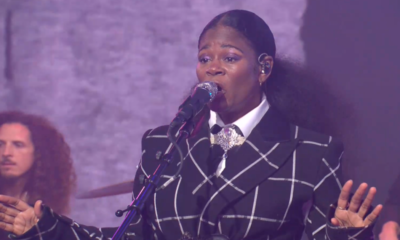Business
Starbucks staff are suing the coffee shop over its ‘tone deaf’ new dress code

Starbucks is facing legal challenges in three US states after workers initiated action over a new dress code. Employees claim the coffee giant broke the law by not reimbursing them for new clothing required by the updated policy.
Backed by the union organising Starbucks staff, workers have filed class-action lawsuits in state courts in Illinois and Colorado. Additionally, complaints have been lodged with California’s Labor and Workforce Development Agency. Should the agency opt not to pursue penalties against Starbucks, the employees intend to launch a class-action lawsuit in California, according to the filings.
The new dress code, implemented on 12 May, mandates that all North American staff wear a plain black shirt, either short or long-sleeved, beneath their signature green aprons. These shirts must cover the midriff and armpits, with collars being optional. Starbucks did provide each employee with two complimentary T-shirts that meet the new specifications.
Employees must wear khaki, black or blue denim bottoms without patterns or frayed hems or solid black dresses that are not more than 4 inches above the knee. The dress code also requires workers to wear black, gray, dark blue, brown, tan or white shoes made from a waterproof material. Socks and hosiery must be “subdued,” the company said.
The dress code prohibits employees from having face tattoos or more than one facial piercing. Tongue piercings and “theatrical makeup” are also prohibited.
Starbucks said in April that the new dress code would make employees’ green aprons stand out and create a sense of familiarity for customers. It comes as the company is trying to reestablish a warmer, more welcoming experience in its stores.
Before the new dress code went into effect, Starbucks had a relatively lax policy. In 2016, it began allowing employees to wear patterned shirts in a wider variety of colors to give them more opportunities for self-expression.
The old dress code was also loosely enforced, according to the Colorado lawsuit. But under the new dress code, employees who don’t comply aren’t allowed to start their shifts.
Brooke Allen, a full-time student who also works at a Starbucks in Davis, California, said she was told by a manager in July that the Crocs she was wearing didn’t meet the new standards and she would have to wear different shoes if she wanted to work the following day. Allen had to go to three stores to find a compliant pair that cost her $60.09.
Allen has spent an additional $86.95 on clothes for work, including black shirts and jeans.
“I think it’s extremely tone deaf on the company’s part to expect their employees to completely redesign their wardrobe without any compensation,” Allen said. “A lot of us are already living paycheck to paycheck.”
Allen said she misses the old dress code, which allowed her to express herself with colorful shirts and three facial piercings.
“It looks sad now that everyone is wearing black,” she said.
The lawsuits and complaints filed Wednesday allege that Starbucks’ dress code violates state laws that require companies to reimburse workers for expenses that primarily benefit the employer. Colorado law also prohibits employers from imposing expenses on workers without their written consent, according to that lawsuit. The plaintiffs seek damages on behalf of all Starbucks workers in those states, whether or not their stores are unionized.
Multiple plaintiffs, like Allen, said they requested reimbursement from Starbucks to conform to the dress code but were denied. Gilbert Cruz, an employee in Aurora, Illinois, requested $10 for the cost of removing a nose piercing.
Worker-led lawsuits in state courts are a shift in tactics in the multi-year effort to unionize Starbucks’ stores.
Starbucks Workers United, the labor group that has unionized 640 of Starbucks’ 10,000 company-owned U.S. stores, has filed hundreds of unfair labor practice charges against Starbucks with the National Labor Relations Board. The union filed an charge over the dress code in April.
But the board’s ability to hear cases has been curtailed under President Donald Trump. Trump fired an NLRB member in the spring, leaving the board without the quorum it needs to decide cases.
Business
Two ships hit near Strait of Hormuz as fears grow of oil price rises

International shipping is said to have come to a standstill at the strait’s entrance, with fears of disruption already pushing up global oil prices.
Source link
Business
Khamenei dead, Middle East on edge: What will be the implications of Trump’s ‘Epic fury’ on stock markets, gold & oil? – The Times of India

The global markets are in for a phase of enhanced turmoil and uncertainty! The ongoing tensions in the Middle East after US and Israel’s strikes on Iran and Ali Khamenei’s death may have investors running for cover – looking for an asset class that is safer.During the night of February 27–28, the United States and Israel carried out joint aerial strikes on Iran as part of “Operation Epic Fury.” Statements by President Trump openly referring to regime change suggest that the confrontation could evolve into a prolonged campaign rather than remain a limited exchange, say market analysts at Franklin Templeton Institute.What does the situation mean for stock markets, energy markets (oil), gold and other asset classes? Here’s what Franklin Templeton Institute analysts have to say:From a market perspective, the key uncertainty is whether the conflict remains confined to direct military engagement or expands into disruptions affecting energy supplies and logistics networks, which would sustain a higher and more persistent risk premium.At the centre of the ongoing uncertainty from a global market and trade perspective is the Strait of Hormuz. While a complete blockade would carry severe consequences for Iran itself, the country has the capability to disrupt maritime traffic through tactics such as vessel harassment, seizures, drone activity, cyber operations, or the use of proxy forces.

Strait of Hormuz
The most immediate economic impact is expected in energy markets, where crude oil and natural gas prices are likely to move higher, they say. Such actions, feel analysts, will keep geopolitical risk premiums at high levels. In 2024, approximately 20 million barrels per day moved through the Strait of Hormuz, which is around one-fifth of global petroleum liquids consumption. Even a limited interference – which can be caused by delays, rerouting, or isolated seizure – can push prices higher through increased risk perception well before any actual shortages emerge.Liquefied natural gas should not be overlooked in this context. Qatar has the world’s third-largest LNG export capacity, and roughly one-fifth of global LNG shipments pass through the Strait of Hormuz, largely consisting of Qatari exports. As a result, shipping risks in the region affect gas markets as significantly as oil markets.Also Read | US-Israel strikes on Iran: How will India be hit by Strait of Hormuz closure? ExplainedShipping expenses have already begun to rise, with insurance costs acting as a major driver. Insurers have started issuing cancellation notices and revising war-risk premiums for voyages in the Gulf region. Some routes have reportedly seen premium increases of up to about 50%, while earlier periods of tension recorded rises exceeding 60% on important trade corridors. These developments effectively tighten supply conditions even when production levels remain unchanged.The possibility of the conflict spreading across the region is increasing. Franklin Templeton Institute analysts are of the view that across global financial markets, the immediate response to such shocks is usually driven by adjustments in risk perception rather than by underlying economic changes. “The initial market reaction for this type of event would typically see Treasury yields move lower and equities lower—mostly a risk-premium repricing. Impacts on activity/earnings may be delayed and uneven. The US dollar reaction is not guaranteed; gold tends to benefit while bitcoin has been trading like a risk asset (i.e., down with equities), reinforcing that it’s not typically a reliable hedge/diversifier in geopolitical drawdowns,” say Franklin Templeton Institute analysts.However, they note that experience shows markets often come to view geopolitical disruptions as temporary. Initial spikes in risk premiums are frequently followed by the realization that the overall effect on corporate profitability is limited. The duration of the conflict, developments in shipping and insurance costs, and the eventual resolution will be more important than the initial headlines.“We would not yet label this a clean buy-the-dip setup—duration, shipping/insurance mechanics, and the endgame matter more than the first headline,” they say.From an investment perspective, the near-term outlook favours sectors linked to energy markets, as well as companies benefiting from higher shipping and insurance costs, along with defence-related industries, the analysts say. At the same time, caution is warranted toward emerging markets that depend heavily on energy imports and toward cyclical sectors sensitive to fuel and logistics costs, including airlines and certain industrial segments.“For protection, we prefer oil upside/volatility structures and selective gold exposure over broad equity shorts—the path will be driven more by shipping/insurance reality than by the new cycle,” they conclude.
Business
Oil jumps 10% and could spike to $100 a barrel, analysts warn

Brent crude jumped 10% to about $80 a barrel over the counter on Sunday, oil traders said, while analysts predicted that prices could climb as high as $100 after U.S. and Israeli strikes on Iran plunged the Middle East into a new war.
The primary driver of this market volatility is the critical Strait of Hormuz. Ajay Parmar, director of energy and refining at ICIS, stated: “While the military attacks are themselves supportive for oil prices, the key factor here is the closing of the Strait of Hormuz.”
Most tanker owners, oil majors and trading houses have suspended crude oil, fuel and liquefied natural gas shipments via the Strait of Hormuz, trade sources said, after Tehran warned ships against moving through the waterway. More than 20% of global oil is moved through the Strait of Hormuz.
“We expect prices to open (after the weekend) much closer to $100 a barrel and perhaps exceed that level if we see a prolonged outage of the Strait,” Parmar said.
Middle East leaders have warned Washington that a war on Iran could lead to oil prices jumping to more than $100 a barrel, said RBC analyst Helima Croft. Barclays analysts also said prices could hit $100.
The OPEC+ group of oil producers agreed on Sunday to raise output by 206,000 barrels per day (bpd) from April, a modest increase representing less than 0.2% of global demand.
While some alternate infrastructure could be used to bypass the Strait of Hormuz, the net impact from its closure would be a loss of 8 million to 10 million bpd of crude oil supply even after diverting some flows through Saudi Arabia’s East-West pipeline and Abu Dhabi pipeline, said Rystad energy economist Jorge Leon.
Rystad expects prices to rise by $20 to about $92 a barrel when trade opens.
The Iran crisis also prompted Asian governments and refiners to assess oil stockpiles and alternative shipping routes and supplies.
-

 Business1 week ago
Business1 week agoEye-popping rise in one year: Betting on just gold and silver for long-term wealth creation? Think again! – The Times of India
-

 Politics1 week ago
Politics1 week agoPakistan carries out precision strikes on seven militant hideouts in Afghanistan
-

 Sports1 week ago
Sports1 week agoKansas’ Darryn Peterson misses most of 2nd half with cramping
-

 Tech1 week ago
Tech1 week agoThese Cheap Noise-Cancelling Sony Headphones Are Even Cheaper Right Now
-

 Entertainment1 week ago
Entertainment1 week agoSaturday Sessions: Say She She performs "Under the Sun"
-

 Business1 week ago
Business1 week agoEquinox chairman says ‘health is the new luxury’ as wellness spending soars
-

 Sports1 week ago
Sports1 week agoHow James Milner broke Premier League’s appearances record
-

 Tech1 week ago
Tech1 week agoThe Supreme Court’s Tariff Ruling Won’t Bring Car Prices Back to Earth






